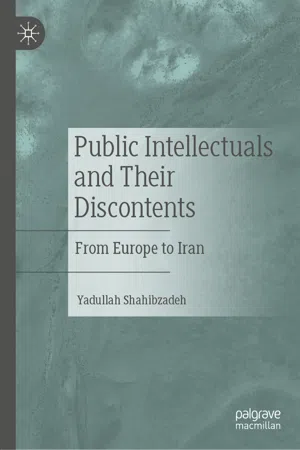More than a century ago, Charles Péguy stated that historians preoccupy themselves with limitless historical detail because it exempts them from writing a history that makes them a part of the boundless historical detail of the historical order.1 The same can be said about the intellectuals in general who write about historical trends, situations, and events but very rarely about their own relations to those phenomena. The intellectuals who write about historical situations and events but never explain their own relations to the situations and events are like the historians who never write their own history. This book is an attempt to shed some light on the history of the concept of the intellectual. It studies its development from its emergence, in the early eighteenth century, to its disappearance, in the early 1990s. The French historian, Jean-Francois Sirinelli, who knows that past events, trends, and facts are the objects of historiography, argued in 1990 that the time was ripe to write the history of the intellectual in France because the French intellectuals were no longer an ideological force, they belonged to the past.2 A few years earlier, Russel Jacoby wrote a history of the American intellectuals for the same reason.3 Since the early 1990s, numerous intellectual historians have written their intellectual histories for the same reason; since the intellectual is a relic of the past, it can be a subject of historiography. Sunil Khilnani wrote Arguing Revolution as a history of the intellectual left in postwar France for the same reason.4 The same can be said about Shlomo Sand’ The End of the French Intellectual.5 By offering different accounts of the emergence and the demise of the intellectuals, these historians conceptualize the intellectual differently. Sirinelli considers intellectual history as an integral part of the history of politics because the intellectuals are known through their manifestos and petitions, which are concrete political responses to socio-political contexts. “Car l’histoire du politique est bien tout à la fois une histoire des comportements et des sensibilités, des cultures et des idées.”6 However, the intellectuals who intervene politically in the existing socio-political context constitute a new context that includes the social networks of the involved intellectuals in the event, their generational peculiarities, and the transformations they undergo in the new context. The new generations of intellectuals appeared at the time of crises to resolve the crises in the critical moments of their nations.7 The term intellectual became, since its emergence, a subject of dispute on whether it designated a profession or a vocation. Some historians understand the intellectual as an exclusively French passion since it presented itself to the French public in 1898 when the French Captain Alfred Dreyfus was found guilty of spying for Germany. In his defense, three thousand members of the French intelligentsia added their names to Émile Zola’s open letter to the French President Felix Faure, published on the first page of the daily newspaper L’Aurore littéraire, artistique, sociale, which Georges Clemenceau, the newspaper editor, entitled J’accuse.8 Intellectuels is the term that Clemenceau uses to describe those French thinkers, scientists, and writers who had endorsed Zola’s letter. The anti-Dreyfusard, Maurice Barrès describes this group of thinkers and writers as the “so-called intellectuals” consisted of protestants, Jews, simpletons, foreigners, and a handful of Frenchmen.9 The Dreyfus Affair made the intellectual a complicated concept to define since the term included people from different social statuses and ideological orientations with different political functions who took a public stance on an issue of public concern. By taking an ethical choice between self-interests or self-preservation and the common good, the intellectual transcends his or her social status, profession, and sociological condition.10 From the Dreyfus Affair to the 1960s, the French intellectuals distinguished themselves from other professionals by siding with their working-class and international communism represented by the Soviet Union. In the 1960s, the defense of the national liberation movements in the third world became a new commitment, not only for the French intellectuals but for the intellectuals throughout the world. By defining the third world nations as the proletarian nations and making them the new agents of history through their anti-colonial struggles, the intellectual constructed the third wordlist ideology.11 Whereas Fanon and Sartre theorized Cuban and the Algerian revolutions, Althusser, and others turned to Mao’s cultural revolution. However, since the integration of the French intellectuals into their national identity had been so all-pervading, their decline could mean the decline of the French identity. The French intellectuals’ successful effort to universalize French politics, since the French Revolution, underpinned the identity of the nation. Thanks to this universalization, the intellectuals throughout the world opposed French colonialism but considered its intellectuals as the strategic allies in the anti-colonial struggles.
The intellectual has always been accompanied by the anti-intellectual. The latter questioned the former’s moral stance and blamed him for butchering social causes and destroying national unity. The history of the intellectual cannot be separated from the anti-intellectual tendencies that the intellectuals encounter throughout their journeys, sociability, friendships, and rivalries.12 Both gradual and sudden changes in the socio-political context can have irreversible consequences for the intellectuals. For instance, the French Socialists and Communists introduced their Common Program in 1972. A few years later, the majority of the French intellectuals rejected radical changes, revolution, and Marxism as the sources of totalitarianism.13 The French intellectuals who rejected revolution and Marxism as a totalitarian ideology included a group of former young revolutionaries who declared themselves as the New Philosophers. Th...
